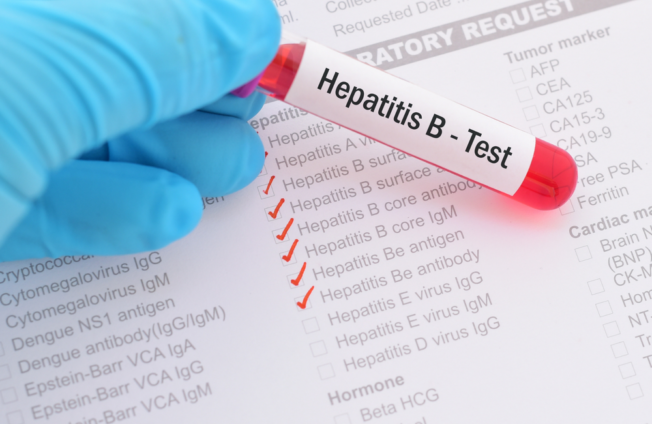Researchers have identified that people living with HIV who are unvaccinated for hepatitis B are at higher risk for new hepatitis B infections.
This is according to a study conducted by a group of scientific researchers and shared at the 2022 Conference on Retroviruses and Opportunistic Infections (CROI).
It also revealed that a particular high risk was found among those individuals with hepatitis C.
The study strongly recommends Hepatitis B Virus (HBV) vaccination in HBV seronegative people living with HIV even if they are on dual active HIV/HBV antiviral therapy.
Its conclusion is that both Vaccines and hepatitis B virus (HBV) specific antiretrovirals (ART) may offer protection for people living with HIV (PLWH) against acquiring new HBV infection.
This study is very important especially for the African Region because the burden of hepatitis B infection is highest in this part of the world - the WHO Western Pacific Region and the WHO African Region, records that 116 million and 81 million people, respectively, are chronically infected.
The Hepatitis B Virus
Hepatitis B is a potentially life-threatening viral infection that attacks the liver and can cause both acute and chronic disease.
It is therefore regarded as a major global health problem because it can cause chronic infection and puts people at high risk of death from cirrhosis and liver cancer.
According to the World Health Organisation (WHO), an estimated 296 million people were living with chronic hepatitis B infection as at 2019, with 1.5 million new infections each year.
In 2019, hepatitis B resulted in an estimated 820,000 deaths.
About one percent of persons living with HBV infection, which estimates at 2.7 million people, are also infected with HIV. The global prevalence of HBV infection in HIV-infected persons is 7.4 percent.
But Hepatitis B can be prevented by vaccines that are safe, available and effective.
Since 2015, WHO has recommended treatment for everyone diagnosed with HIV infection, regardless of the stage of disease. Tenofovir, which is included in the treatment combinations recommended as first-line therapy for HIV infection, is also active against HBV.
In conclusion, the study underlining the importance of recommending HBV vaccination in HBV seronegative PLWH even if they are on dual active HIV/HBV antiviral therapy is very critical.
The Study
At CROI 2022, the study presented by Mamta Jain from the University of Texas Southwestern Medical Center on behalf of the five authors, examined the incidence of HBV and factors which predicted risk for acquiring infection among Persons Living with HIV (PLWH) in the US.
The study included all PLWH with a minimum of 1 to 9 years of follow-up from January 1, 2011 to December 31, 2018.
Patients with no HIV viral load or CD4 counts as well as those with signs of chronic HBV infection were excluded from the study.
Out of 26,152 PLWH, 12,285 were included.
35.2percent had CD4 below 200 cells/µL, 12.3percent had HIV viral load less than 50 copies/mL, 42.6percent were HBV immune at study entry.
Within two (2) years of study, 80.6percent were on an HBV-specific HIV regimens. Overall, 0.49 percent (n= 60; 65percent non-immune and 52percent with CD4 less than 200 cell/µL at baseline) developed incident hepatitis B during follow-up.
But in contrast to other studies, the authors did not observe a protective effect of HBV specific medication at baseline for development of new HBV infection in follow-up. The poster however did not provide information which HBV specific medication was used.
Meanwhile, prior studies from the Netherlands demonstrated a persistent risk for new HBV infections in PLWH receiving 3TC as sole HBV active agent but not necessarily in tenofovir treated patients who were sixteen (16).
Moreover, the US investigators showed that patients with HCV infection were at increased risk for acquiring HBV infection underlining the need for HBV vaccination in this population subgroup.
The study was authored by Mamta K. Jain, Karen J. Vigil, Onkar Kshirsagar, Laura A. Hansen, Barbara S. Taylor, and Mae Thamer.
Latest Stories
-
Poll results alone don’t constitute victory for any political party- Asiedu Nketia cautions NDC
57 mins -
Gyakie spills truth on her journey to fame
1 hour -
Energy sector CSOs challenge President Akufo-Addo to transparent value for money audit of SML contract
1 hour -
Plunderers of the State will face the music – Prof Jane Opoku-Agyemang promises
1 hour -
We don’t feel safe after inconsiderate conduct of Regional Minister – Ashanti ECG staff
2 hours -
Ghana needs urgent reset and inspiring leadership – Mahama
3 hours -
Asiedu Nketia cautions NDC: Don’t be complacent, election 2024 victory isn’t assured yet
3 hours -
Ongoing power crisis worst in the 4th Republic- Alhassan Suhuyini
3 hours -
Power challenges would be over in the next few days – Herbert Krapa
3 hours -
Full text: Acceptance speech by Prof Naana Opoku-Agyemang as Mahama’s running mate
3 hours -
Government’s fiscal adjustment on track – Report
3 hours -
Commercial drivers damn threats, unilaterally hike transport fares
4 hours -
Restore dignity to Vice President’s office – Fifi Kwetey to Prof Naana Opoku-Agyemang
4 hours -
Women face mounting pressures, feel unsafe at workplace – Deloitte
4 hours -
Bright Simons asks: Where is the KPMG report on SML contract audit?
4 hours

